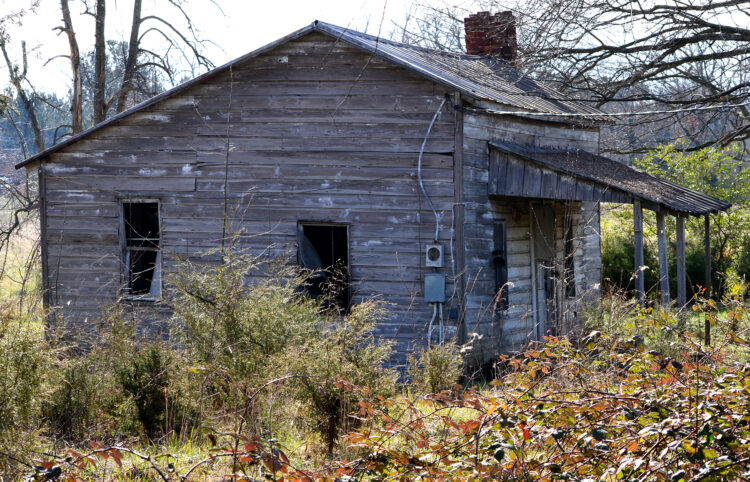
Tenant house / Photos by Jason Benavides
June 9. By Dan Morrill. J. Wilson Alexander belonged to a family who had farmed in North Mecklenburg since the American Revolutionary War. In addition to being a highly successful cotton farmer, Alexander was a community leader in the Cornelius area and beyond.
J. Wilson Alexander was a member of the Mecklenburg County School Board. He was a trustee of North Carolina A&T. He served one term in the North Carolina General Assembly.
J. Wilson Alexander played a significant role in bringing rural electrification to North Mecklenburg and increasing the number of paved roads.
Cotton farming
It was the growing of cotton that took most of J. Wilson Alexander’s time and energy. Intelligent and resourceful, J. W. Alexander improved the economic standing of his family by harvesting lots of cotton and hauling it to Cornelius to be ginned. In 1929, he received the award for producing more cotton per acre than any farmer in North Carolina. His family remembers James Wilson Alexander with great respect and affection.
Cotton farming was hard work. J. Wilson Alexander and his family did not sit idly by and watch the field hands pick the crop. They toiled in the hot sun too. But the tenant farm families labored long hours, and their living conditions were far inferior to those enjoyed by J. Wilson Alexander and his family. But at least the tenants had a home and received a wage.
Tenant house family
The Alexander Farm Tenant House had several tenants over the years. John Norman and his wife Carrie lived in the Alexander Farm Tenant House in the late 1930s and early 1940s. Among their children was Gaither Norman, who married John Lee Potts, who also worked on the Alexander Farm. Gaither and John Potts occupied the tenant house in the years following World War II. They sometimes used the surname “Knox.”
Gaither and John Lee Potts were most likely in their late teens or early twenties when they became the primary residents of the Alexander Farm Tenant House. Gaither was a homemaker. She also helped with cooking and cleaning at the Alexander farmhouse. John was a farmhand. John and Gaither interacted daily with members of the Alexander family. Their relationship was personal, not just business-like.
J. Wilson Alexander never had more than a handful of tenants. Unlike larger farms, where discipline was harsh and less personalized, regulations on places like the Alexander Farm were more informal and flexible. “We treated the tenants almost like family,” remembers one of J. W. Alexander’s granddaughters.
A particularly dramatic event occurred in January 1946. One of J. W. Alexander’s sons was working with John Potts harvesting the corn crop when one of the son’s arms got caught in the corn shredder. The son would have lost his entire arm if John had not rushed to the son’s aid. Such events strengthen emotional bonds.
Decline of cotton
Cotton harvests declined steadily in Meckenburg County in the 1950s, and never recovered.
Tenants began to seek employment away from the farms but continued to reside in the tenant houses. Gaither became a cook at local restaurants, and John worked in a sawmill.
They remained in the Alexander Farm Tenant House.
Gaither died in 1988. Gaither Potts is buried in the Caldwell Presbyterian Church Cemetery on Brown Mill Road. John died in 1992.

Morrill
Dan Morrill is a retired UNC-Charlotte history professor and former consulting director of the Charlotte Landmarks Commission



